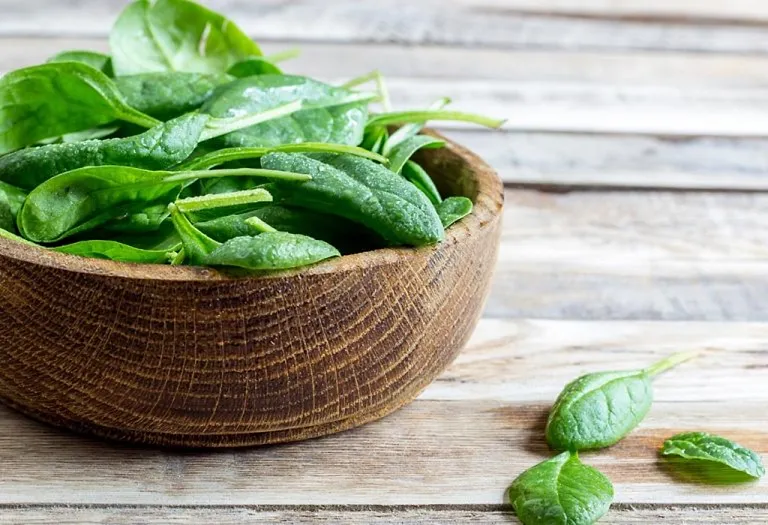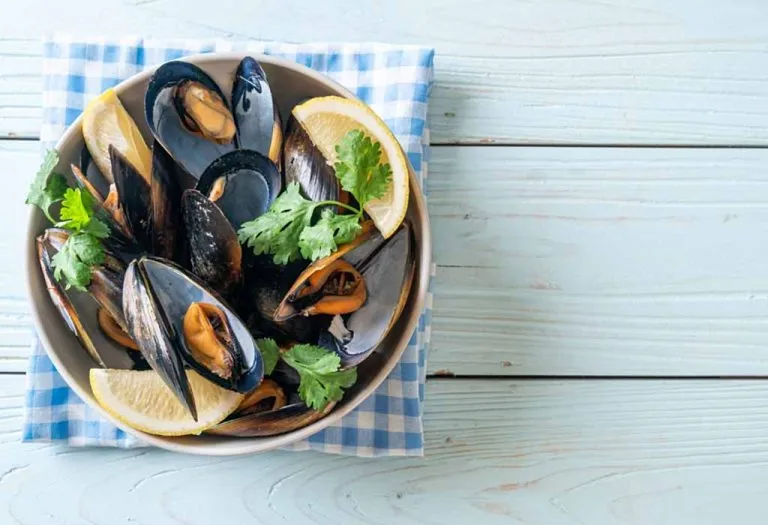Eating Spinach in Pregnancy: Health Benefits & Side Effects

- Is It Safe to Eat Spinach When Pregnant?
- Nutritional Value of Spinach
- Different Types of Spinach to Eat During Pregnancy
- Benefits of Consuming Spinach During Pregnancy
- Side Effects of Eating Spinach During Pregnancy
- How to Include Spinach in Your Pregnancy Diet?
- Spinach Recipes for Pregnant Women
- FAQs
Spinach is a leafy green vegetable and is considered very healthy. Eating spinach may help prevent cancer, lower blood pressure levels, and improve eye health. This leafy vegetable can even benefit the health of a pregnant woman greatly. If you are pregnant, you know well that you need to consume everything healthy there is for your baby’s healthy growth and development. Spinach is one such vegetable that can provide you with enough and more nutrients during pregnancy. Read this article to find out how spinach can benefit your health during pregnancy.
Is It Safe to Eat Spinach When Pregnant?
Is spinach good for pregnancy? Yes, it is generally safe to eat spinach during pregnancy. Spinach is a nutritious leafy green vegetable rich in vitamins and minerals such as iron and folate, which are important for a healthy pregnancy. However, it’s advisable to wash spinach thoroughly to remove any potential contaminants, and it’s essential to maintain a balanced and varied diet during pregnancy. If you have specific concerns or conditions, it’s recommended to consult with a healthcare professional for personalized advice.
Nutritional Value of Spinach
A single serving of spinach (100 grams) will provide you with the following nutrients (1).
| Nutrient | Value Per 100 grams |
| Calories | 23 kcal |
| Protein | 2.86 grams |
| Carbohydrates | 3.63 grams |
| Fat | 0.39 grams |
| Iron | 2.71 grams |
| Folate | 194 mcg |
| Calcium | 99 mg |
Apart from these nutrients, spinach is also loaded with different Vitamins such as Vitamin A, B Vitamins, Vitamin C, phosphorus, sodium, potassium, and magnesium – thus playing a major role in the growth and development of the foetus during pregnancy.
Different Types of Spinach to Eat During Pregnancy
When considering spinach for pregnancy, it’s important to explore various types to ensure a diverse and balanced intake of nutrients. Here, we discuss three types of spinach that can be beneficial for pregnant women, each offering its unique nutritional profile.
1. Baby Spinach (Spinacia oleracea var. All Green)
Baby spinach, harvested early, is tender and milder in flavor compared to mature spinach. It is rich in essential nutrients such as iron, folate, and vitamin C, contributing to the overall well-being of both the mother and the developing baby.
2. Malabar Spinach (Basella alba)
Malabar spinach, although botanically different from true spinach, is a leafy green commonly used in a similar culinary context. It is an excellent source of iron and vitamins A and C. The mild taste and high nutritional content make it a valuable addition to a pregnancy diet.
3. Savoy Spinach (Spinacia oleracea var. Savoy)
Savoy spinach has curly and dark green leaves, offering a rich flavor. It contains a good amount of fiber, aiding digestion, and is a good source of folate, essential for the early stages of fetal development. Savoy spinach adds variety to the diet, ensuring a spectrum of nutrients for both mother and baby.
Benefits of Consuming Spinach During Pregnancy
Spinach is very healthy and can offer many nutrients. Following are the benefits of spinach during pregnancy.
1. Helps in the Cognitive Development of the Baby
Spinach is a rich source of folic acid (also known as folate or Vitamin B9), which is essential for a pregnant woman as it prevents miscarriages. It contributes towards spinal and cognitive development of the foetus. Being a rich source of iron, spinach also helps in the production of red blood cells, thus lowering the risk of anaemia, which is a common problem during pregnancy (2).
2. Helps Improve Mood
The presence of Vitamin B in spinach can help improve your mood during pregnancy. If you experience morning or afternoon blues too much, consider adding some spinach in your diet. Your brain and body will thank you. Eating spinach can help prevent depression and lower stress and anxiety.
3. Helps in the Growth of Bones and Teeth
Calcium is an important mineral for bone health and for the proper growth of the teeth. You get approximately 99 mg of calcium in a 100 gm serving of spinach. Besides bone development, calcium also helps prevent blood clots in the arteries and is responsible for improving nerve/muscle functions too (3).
4. Helps Balance Cholesterol Levels
Vitamin E can help fight free radical damage, improve your vision, and balance cholesterol levels in your body during pregnancy. You can eat cooked spinach while pregnant to get optimum Vitamin E.
5. Boosts Immunity
During pregnancy, your immune system will be weak but the little one growing in your womb will require extra protection against various infections. Luckily, spinach contains ample amounts of vitamin C which is known to strengthen the immune system and ward off diseases. By eating spinach during pregnancy, you can also say goodbye to the common cold and frequent ailments. Spinach will also aid digestion!
6. Regulates Blood Pressure Levels
The nitrate in spinach is known for regulating blood pressure levels in the body. High blood pressure is a common problem during pregnancy, but by including spinach in your pregnancy diet, you can control your blood pressure levels. The high potassium content in spinach can help lower your blood pressure and bring it to normal levels.
7. Helps Improve Vision
Spinach is a rich source of Vitamin B1 and Vitamin B2. Both these vitamins play a major role in the development of vision and the nervous system of the foetus. A lack of Vitamin B1 in your pregnancy diet can lead to a condition termed as ‘peripheral neuropathy’. Vitamin B2 helps in the development of reproductive tissues and organs inside the body. So include spinach in your diet and get enough of B vitamins. However, spinach alone won’t provide you with all the essential nutrients, you will have to take multivitamins prescribed by your doctor. These vitamin tablets will ensure good health and proper development of your baby.
8. Gives Glowing Skin
Spinach is a good source of protein. Protein is required for repairing cells, producing amino acids in the body, and for maintaining good skin, muscle and bone health. And spinach can meet your protein requirements to an extent. So include this leafy green vegetable in your diet to stay healthy.
9. Enhances Digestive Health
Spinach is a good source of fiber, aiding in digestion and preventing constipation, a common issue during pregnancy. The fiber content in spinach promotes regular bowel movements, contributing to overall digestive well-being.
10. Manages Gestational Diabetes Risk
Spinach has a low glycemic index and is rich in nutrients like magnesium. Including spinach in the diet may help manage blood sugar levels, reducing the risk of gestational diabetes during pregnancy.
11. Reduces Inflammation and Swelling
The anti-inflammatory properties of spinach, attributed to nutrients like Vitamin K and antioxidants, may help alleviate swelling and inflammation often experienced during pregnancy (4). This can contribute to increased comfort for expecting mothers.
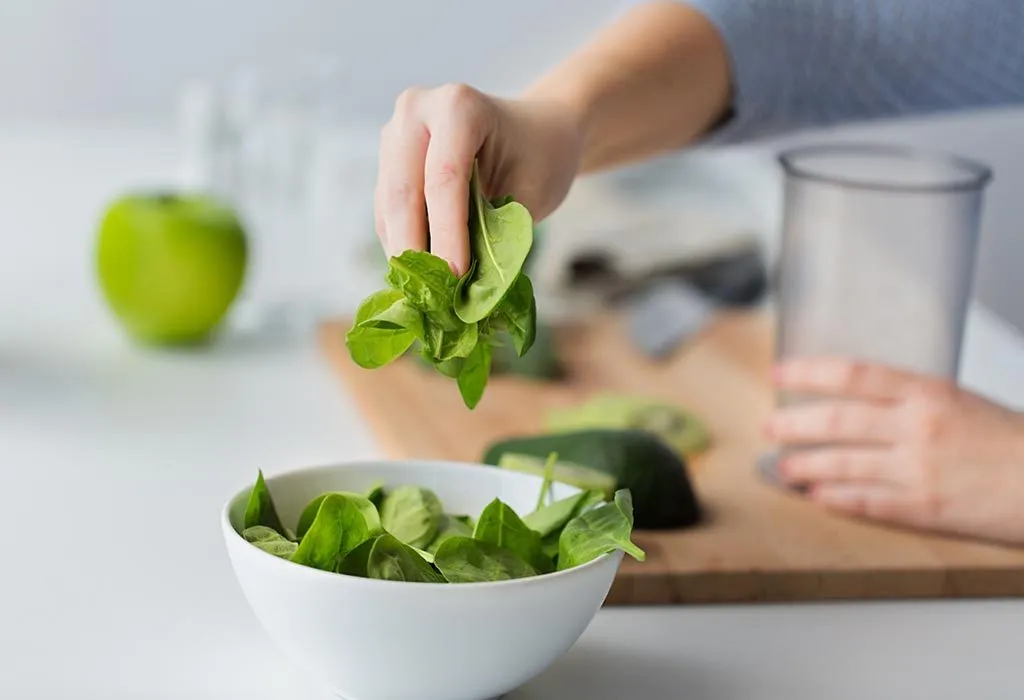
Side Effects of Eating Spinach During Pregnancy
Spinach is very healthy and can be included in the pregnancy diet, it can lead to certain side effects. If you consume too much, it can lead to the following side effects.
1. Constipation and Bloating
Spinach is high in dietary fibre and our bodies take time getting accustomed to the high fibre intake. If your stomach is not used to a high-fibre diet, you may experience constipation, gas, bloating and abdominal cramps, if you eat too much spinach. And all these problems may make your pregnancy even more uncomfortable.
2. Diarrhoea
Pregnant women are at risk of contracting listeriosis and salmonellosis. Spinach leaves may harbor bacterial contaminants that have the potential to cause diarrhea (5). Hence, it is crucial to thoroughly wash the leaves before consumption.
3. Kidney Stones
Spinach contains too much of ‘purines’ which are a certain group of compounds that get converted to uric acid inside our body when ingested too much. Too much uric acid precipitates the calcium in our gout and leads to the development of kidney stones (6). Besides this, there is plenty of oxalic acid in spinach too which causes calcium oxalate precipitation. To prevent the formation of kidney stones in your body, consume spinach in moderation.
4. Risk of Pesticide Residues
Spinach is one of the vegetables that may carry pesticide residues. While washing spinach thoroughly can reduce this risk, it’s essential to be mindful of potential exposure. Pregnant women may choose organic spinach to minimize pesticide intake during pregnancy.
How to Include Spinach in Your Pregnancy Diet?
Including spinach in your pregnancy diet can be a delicious and nutritious way to ensure you and your baby receive essential vitamins and minerals (7). Here are some creative and safe ways to incorporate spinach into your meals during pregnancy.
- Spinach Smoothies: Blend fresh or frozen spinach leaves into fruit smoothies for a nutrient-packed beverage. The sweetness of fruits can help mask the taste of spinach, providing a refreshing and healthy option.
- Salads and Sandwiches: Add fresh spinach leaves to your salads and sandwiches for a crunchy texture and a boost of vitamins. Combine spinach with a variety of colorful vegetables to create a vibrant and nutrient-rich meal.
- Spinach Soups and Stews: Incorporate spinach into soups and stews during pregnancy for a hearty and nutritious addition. Spinach complements various soup bases and adds a wealth of vitamins and minerals to your diet.
- Sauteed or Stir-Fried Spinach: Lightly sauté or stir-fry spinach with garlic and olive oil for a quick and tasty side dish. This cooking method helps retain the nutritional value of spinach while enhancing its flavor.
- Spinach in Casseroles and Quiches: Include spinach in casseroles, quiches, or other baked dishes for a flavorful and nutritious twist. Mixing spinach with cheese and other ingredients can create a satisfying and well-balanced meal.
Spinach Recipes for Pregnant Women
Incorporating spinach into your diet during pregnancy can be both delicious and beneficial for your health and the development of your baby. Here are three nutritious spinach recipes that pregnant women can enjoy.
1. Spinach and Feta Stuffed Chicken Breast

Ingredients:
- 2 boneless, skinless chicken breasts
- 1 cup fresh spinach leaves
- 1/2 cup crumbled feta cheese
- 1 tablespoon olive oil
- Salt and pepper to taste
How to Make:
- Preheat the oven to 375°F (190°C).
- Cut a pocket into each chicken breast.
- In a bowl, mix the spinach and feta. Stuff each chicken breast with the mixture.
- Season the chicken with salt and pepper.
- Heat olive oil in an oven-safe skillet, sear the chicken, then transfer to the oven.
- Bake for about 25-30 minutes or until the chicken is cooked through.
2. Spinach and Berry Smoothie
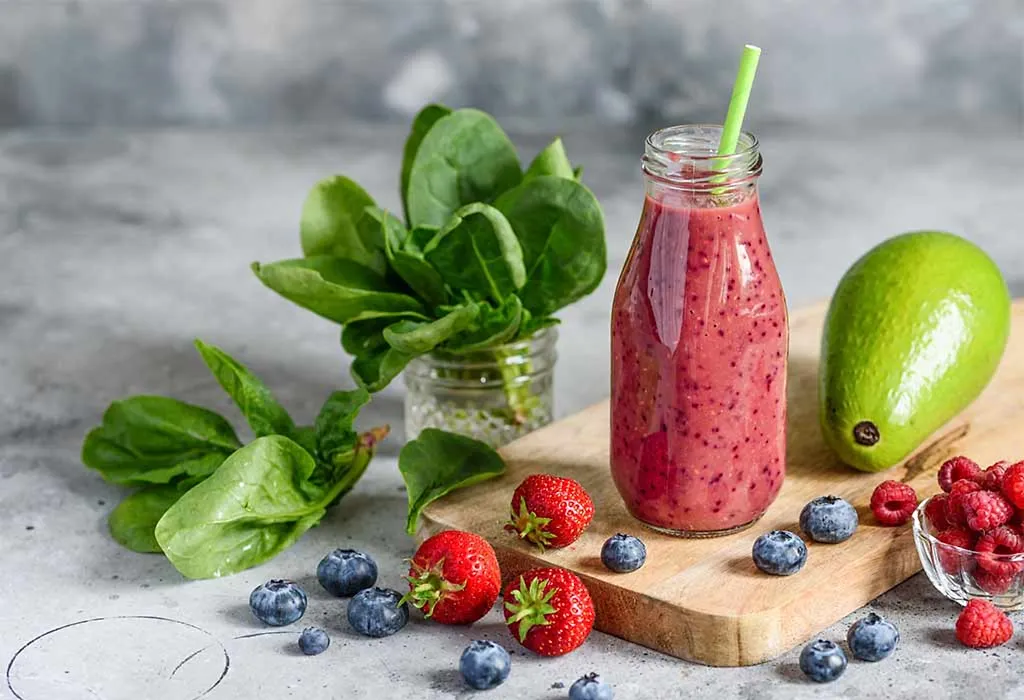
Ingredients:
- 1 cup fresh spinach leaves
- 1/2 cup mixed berries (strawberries, blueberries, raspberries)
- 1 banana
- 1/2 cup Greek yogurt
- 1 cup almond milk
- Ice cubes (optional)
How to Make:
- Blend spinach, berries, banana, Greek yogurt, and almond milk until smooth.
- Add ice cubes if desired and blend again.
- Pour into a glass and enjoy this refreshing and nutrient-packed smoothie.
3. Spinach and Mushroom Quinoa Bowl
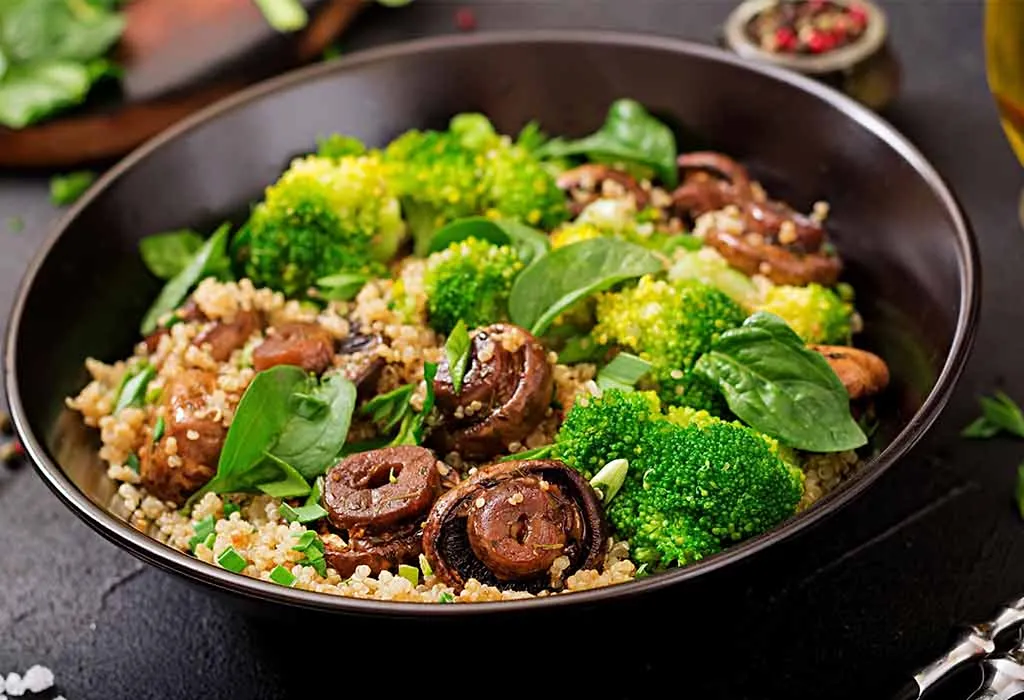
Ingredients:
- 1 cup quinoa, cooked
- 2 cups fresh spinach leaves
- 1 cup sliced mushrooms
- 1 clove garlic, minced
- 1 tablespoon olive oil
- Lemon juice, salt, and pepper to taste
How to Make:
- In a pan, saute garlic in olive oil until fragrant.
- Add mushrooms and cook until they release their moisture.
- Add spinach and cook until wilted.
- Stir in cooked quinoa and continue to cook until heated through.
- Season with lemon juice, salt, and pepper. Serve warm.
FAQs
1. How Much Spinach Should You Include in Your Pregnancy Diet?
While pregnant, you can include half a cup of spinach in your pregnancy diet. Make sure you keep the amount limited as too much of spinach can lead to complications during pregnancy.
2. Can I Have Spinach Salad During Pregnancy?
Yes, you can have spinach salad during pregnancy as long as you make sure that the spinach leaves you are using are fresh and do not have marks or holes in them. Also, before you add spinach leaves to your salad wash them properly and eat the salad fresh.
3. Is It Safe to Drink Spinach Juice During Pregnancy?
Yes, it is generally safe to drink spinach juice during pregnancy, but moderation is key. Ensure that the spinach is thoroughly washed to reduce the risk of contaminants, and consult with your healthcare provider for personalized advice.
4. Can Pregnant Women Eat Raw Spinach?
Yes, pregnant women can eat raw spinach, but it’s important to wash it thoroughly to remove any potential contaminants. Raw spinach is a nutritious addition to salads and sandwiches, providing essential vitamins and minerals.
5. Can You Get Food Poisoning by Consuming Spinach During Pregnancy?
While the risk is generally low, improper washing of spinach may lead to foodborne illnesses. Thoroughly wash and cook spinach to reduce the risk of contamination. Pregnant women should be cautious about potential sources of food poisoning.
6. Can Spinach Help With Pregnancy Issues Such as Anemia?
Yes, spinach is a good source of iron, which is crucial for preventing and addressing anemia during pregnancy. Including spinach in the diet can contribute to the increased iron intake needed for both the mother and the developing baby.
7. Can Consuming Spinach in Pregnancy Lead to Hard Stools?
While palak in pregnancy is a good source of fiber, which generally promotes healthy digestion, excessive consumption may lead to hard stools for some individuals. It’s essential to maintain a balanced diet and stay hydrated to support healthy digestion during pregnancy.
Although spinach isn’t your ultimate vegetable for all pregnancy ailments, it can provide you with enough and more nutrients that you will need during pregnancy. If you are considering adding spinach during pregnancy in the second and third trimester and you are on medication, talk to your dietician regarding how much spinach you are allowed to eat. Add a little bit of it, and you’ll slowly notice its benefits.
References/Resources:
1. Spinach; U.S. Department of Agriculture; https://fdc.nal.usda.gov/fdc-app.html#/food-details/168462/nutrients
2. Soma-Pillay. P, Catherine. N, Tolppanen. H, Mebazaa. A; Physiological changes in pregnancy (Cardiovascular Journal of Africa); National Library of Medicine; https://www.ncbi.nlm.nih.gov/pmc/articles/PMC4928162/
3. Calcium; Oregon State University; https://lpi.oregonstate.edu/mic/minerals/calcium
4. Beaupré. V, Boucher. N, Desgagné-Penix. I, Thykamine Extracts from Spinach Reduce Acute Inflammation In Vivo and Downregulate Phlogogenic Functions of Human Blood Neutrophils In Vitro (Biomedicines); National Library of Medicine; https://www.ncbi.nlm.nih.gov/pmc/articles/PMC7399895/; July 2020
5. Mritunjay. S, Kumar. V; A study on prevalence of microbial contamination on the surface of raw salad vegetables (3 Biotech); National Library of Medicine; https://www.ncbi.nlm.nih.gov/pmc/articles/PMC5385173/; April 2017
6. Frassetto. L, Kohlstadt. I; Treatment and Prevention of Kidney Stones: An Update (American Family Physician); American Academy of Family Physicians; https://www.aafp.org/pubs/afp/issues/2011/1201/p1234.html; December 2011
7. Nutrition During Pregnancy; Johns Hopkins Medicine; https://www.hopkinsmedicine.org/health/wellness-and-prevention/nutrition-during-pregnancy
Also Read:
Eating Broccoli during Pregnancy
Consuming Cabbage when Pregnant
Eating Cucumber while Pregnant
Consuming Lady Finger (Okra) in Pregnancy
Was This Article Helpful?
Parenting is a huge responsibility, for you as a caregiver, but also for us as a parenting content platform. We understand that and take our responsibility of creating credible content seriously. FirstCry Parenting articles are written and published only after extensive research using factually sound references to deliver quality content that is accurate, validated by experts, and completely reliable. To understand how we go about creating content that is credible, read our editorial policy here.







